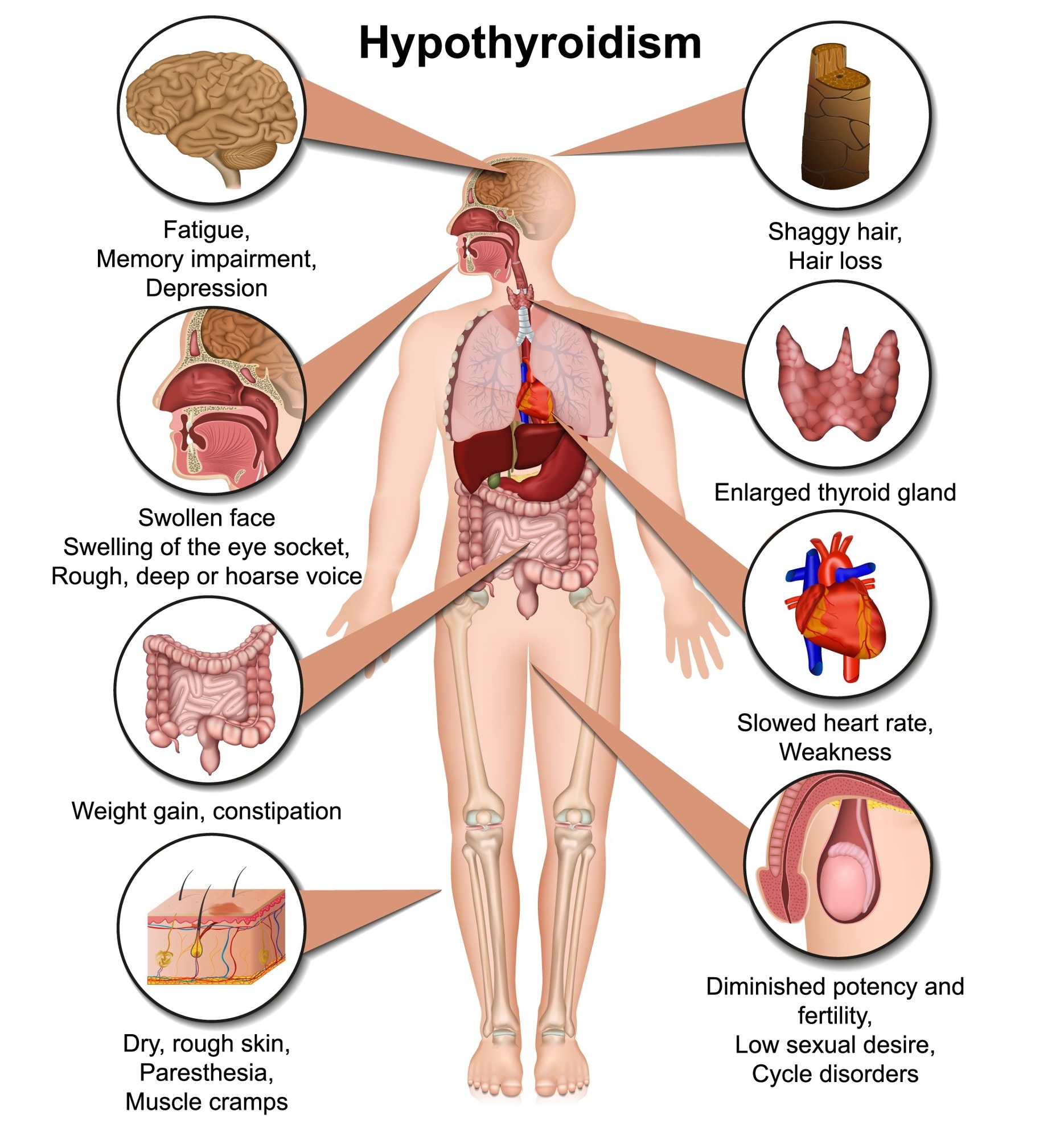Hyperthyroidism is a health condition resulting from the overactivity of the thyroid gland. It can be diagnosed by a presenting history and a physical examination, in addition to several tests to confirm the diagnosis and investigate the cause of the condition.
Physical Examination
A physical examination is an integral part of the diagnostic process to investigate any signs or symptoms that may be indicative of hyperthyroidism. Typical symptoms of hyperthyroidism may include:
- Enlarged thyroid gland
- Heart palpitations
- Hand tremor
- Clammy skin
- Increased appetite with loss of weight
- Protrusion of the eyes
An enlarged thyroid gland is often visible, particularly in more severe cases. It appears as a lump or several lumps at the front of the base of the neck, below the voice box.
It is also essential that the patient consultation allows the individual to report any other symptoms related to the condition, such as nervousness or skin changes. Hyperthyroidism can cause a range of symptoms, depending on the specific case.
Symptoms of thyrotoxicosis range from warm, moist skin and staring eyes to tremors of the outstretched arm and muscle weakness.

Hyperthyroidism or overactive thyroid. Hyperthyreosis. Signs and Symptoms thyroid dysfunction - Image Copyright: medicalstocks / Shutterstock
Examination of the eyes and the skin
Approximately half of patients with Graves’ disease have eye symptoms such as protruding eyes, difficulty closing the lids completely, swelling of the conjunctiva, and double vision. Pretibial myxedema refers to thickening of the skin over the lower leg.
Thyroid Function/Blood Tests
Blood tests to measure the concentration of the thyroid hormones thyroxine (T4) and triiodothyronine (T3), in addition to thyroid-stimulating hormone (TSH), are essential to confirm the diagnosis of hyperthyroidism. This also helps to narrow down the diagnosis and exclude other conditions with similar symptoms.
Individuals with hyperthyroidism will have unique blood test results, showing a low concentration of TSH and high levels of T3 and T4. TSH is usually secreted from the pituitary gland and stimulates the thyroid gland to produce more hormones. In hyperthyroidism, the levels of thyroid hormones are higher than normal despite lower-than-normal TSH production.
Some individuals may have blood test results that show normal levels of T3 and T4 but lower levels of TSH than average. This is known as a subclinical overactive thyroid gland. This condition does not usually require treatment, and often, the hormone levels return to normal spontaneously within several weeks or months. It is best to monitor the hormone levels and manage appropriately if the T3 and T4 concentrations become elevated.
Iodine Uptake Scan
The iodine uptake scan helps to measure the function of the thyroid gland by measuring the amount of iodine that the gland takes up to produce thyroid hormones.
This test involves administering a small dose of radioactive iodine on an empty stomach. Over the following hours, the iodine is taken up into the thyroid gland or excreted in the urine. The concentration in the thyroid gland is used as an indicator of hyperthyroidism.
Thyroid Scan
This test also involves administering radioactive iodine to the thyroid gland. The scan then uses the radioactive iodine's gamma-ray emissions to construct an image, or scintigram, of the thyroid gland structure.
As both the iodine uptake scan and the thyroid scan involve the administration of radioactive iodine, both tests are usually undertaken at the same time during the diagnostic process.
Determining the Cause
It is also important to identify the likely cause of hyperthyroidism during the diagnostic process, as this will help to guide the treatment decisions. Possible causes include:
- Graves’ disease
- Thyroid nodules (goiter)
- Thyroiditis
- Iodine supplementation
- Drugs such as amiodarone
- Thyroid cancer
Each of these types of hyperthyroidism has a unique cause, which should be addressed to normalize the thyroid gland's function. This may include changing medications such as amiodarone or iodine supplements or surgery to remove abnormal growth of the thyroid gland.
Ella's story - Hyperthyroidism [British Thyroid Foundation]
References
- “Hyperthyroidism Diagnosis | Conditions & Treatments | UCSF Medical Center.” Ucsfhealth.org, 2019, https://www.ucsfhealth.org/conditions/hyperthyroidism/diagnosis.html
- Overactive thyroid (hyperthyroidism) - Diagnosis 2018, nhs.uk, viewed 23 May 2024, http://www.nhs.uk/Conditions/Thyroid-over-active/Pages/Diagnosis.aspx
- American Thyroid Association 2016, Hyperthyroidism | American Thyroid Association, American Thyroid Association, http://www.thyroid.org/hyperthyroidism/
- Hyperthyroidism and Thyrotoxicosis Clinical Presentation: History, Physical Examination. (n.d.). Emedicine.medscape.com. http://emedicine.medscape.com/article/121865-clinical#b3
- “Hyperthyroidism: MedlinePlus Medical Encyclopedia.” Medlineplus.gov, https://www.nlm.nih.gov/medlineplus/ency/article/000356.htm
Further Reading
Last Updated: May 23, 2024